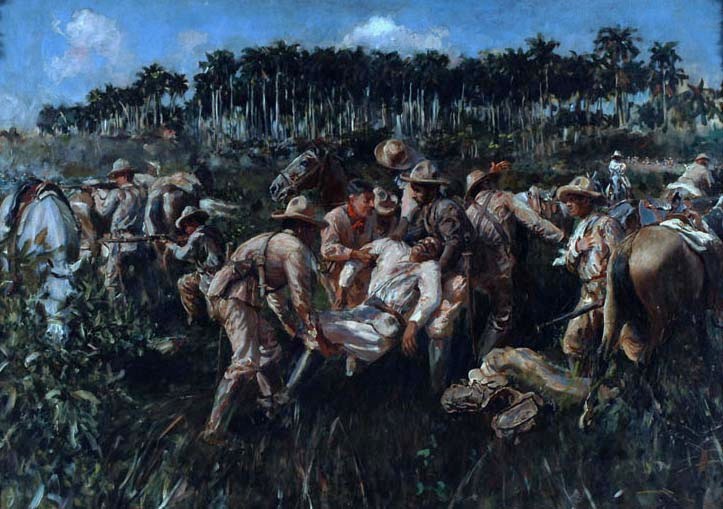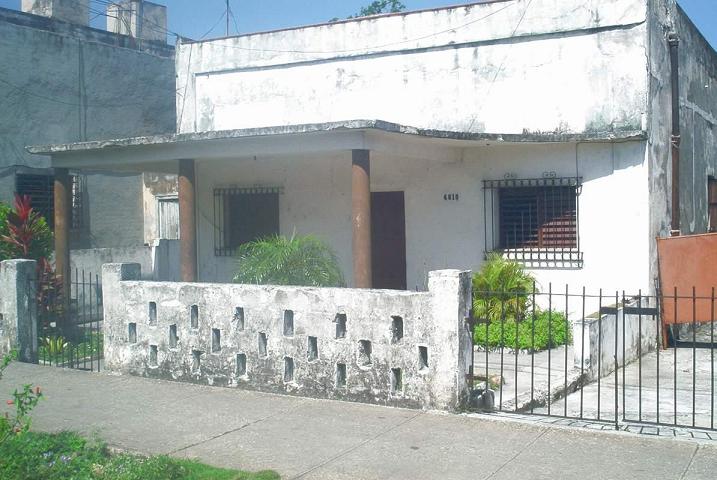|
Manolito Y Su Trabuco
Manolito y su Trabuco is a salsa and timba group out of Camaguey and Havana, Cuba. It is named for founding member, pianist Manolito Simonet. ''Trabuco'' literally means a firearm from the times of the Independence War of 1895 and figuratively refers to anything forceful or strong (Vaughan 2012: Kindle 345). History On February 26, 1993, after spending at least six years as musical director of Maravilla de Florida, Manolito Simonet departed along with most of the group's members, added a horn section, synthesizer and kick drum, and started playing timba under the name Manolito y su Trabuco. In 1996 United States based Bembe Records released Manolito's first CD ''Directo al corazón'' in North America. This was the first of Bembe's "Salsa cubana" series, an attempt to market the new Cuban popular music as salsa. For the most part however, acceptance of timba in the salsa market has been limited. In 1997, during the height of timba's popularity, the Buena Vista Social Club release ... [...More Info...] [...Related Items...] OR: [Wikipedia] [Google] [Baidu] |
Salsa Music
Salsa music is a style of Latin American music. Because most of the basic musical components predate the labeling of salsa, there have been many controversies regarding its origin. Most songs considered as salsa are primarily based on son montuno, with elements of Mambo (music), mambo, Latin jazz, Bomba (Puerto Rico), bomba, plena and guaracha. All of these elements are adapted to fit the basic son montuno template when performed within the context of salsa. Originally the name salsa was used to label commercially several styles of Latin dance music, but nowadays it is considered a musical style on its own and one of the staples of Latin American culture. The first self-identified salsa bands were predominantly assembled by Cubans, Cuban and Puerto Ricans, Puerto Rican musicians in New York City in the '70s. The music style was based on the late son montuno of Arsenio Rodríguez, Conjunto Chappottín and Roberto Faz. These musicians included Celia Cruz, Willie ColónRuben Blade ... [...More Info...] [...Related Items...] OR: [Wikipedia] [Google] [Baidu] |
Timba
Timba is a Cuban genre of music based on Cuban ''son'' with ''salsa'', American Funk/R&B and the strong influence of Afro-Cuban folkloric music. Timba rhythm sections differ from their salsa counterparts, because timba emphasizes the bass drum, which is not used in salsa bands. Timba and salsa use the same tempo range and they both use the standard conga marcha. Almost all timba bands have a trap drummer. Timbas also often break the basic tenets of arranging the music in- clave. Timba is considered to be a highly aggressive type of music, with rhythm and "swing" taking precedence over melody and lyricism. Associated with timba is a radically sexual and provocative dance style known as despelote (literally meaning chaos or frenzy). It is a dynamic evolution of salsa, full of improvisation and Afro Cuban heritage, based on son, Rumba and mambo, taking inspiration from Latin jazz, and is highly percussive with complex sections. Timba is more flexible and innovative than salsa, an ... [...More Info...] [...Related Items...] OR: [Wikipedia] [Google] [Baidu] |
Havana
Havana (; Spanish: ''La Habana'' ) is the capital and largest city of Cuba. The heart of the La Habana Province, Havana is the country's main port and commercial center.Cuba ''''. . The city has a population of 2.3million inhabitants, and it spans a total of – making it the largest city by area, the most populous city, and the [...More Info...] [...Related Items...] OR: [Wikipedia] [Google] [Baidu] |
Independence War Of 1895
The Cuban War of Independence (), fought from 1895 to 1898, was the last of three liberation wars that Cuba fought against Spain, the other two being the Ten Years' War (1868–1878) and the Little War (1879–1880). The final three months of the conflict escalated to become the Spanish–American War, with United States forces being deployed in Cuba, Puerto Rico, and the Philippine Islands against Spain. Historians disagree as to the extent that United States officials were motivated to intervene for humanitarian reasons but agree that yellow journalism exaggerated atrocities attributed to Spanish forces against Cuban civilians. Background During the years 1879–1888 of the so-called "Rewarding Truce", lasting for 17 years from the end of the Ten Years' War in 1878, there were fundamental social changes in Cuban society. With the abolition of slavery in October 1886, freedmen joined the ranks of farmers and the urban working class. The economy could no longer sustain itse ... [...More Info...] [...Related Items...] OR: [Wikipedia] [Google] [Baidu] |
Buena Vista Social Club
Buena Vista Social Club is an ensemble of Cuban musicians established in 1996. The project was organized by World Circuit executive Nick Gold, produced by American guitarist Ry Cooder and directed by Juan de Marcos González. They named the group after the homonymous members' club in the Buenavista quarter of Havana, a popular music venue in the 1940s. To showcase the popular styles of the time, such as son, bolero and danzón, they recruited a dozen veteran musicians, some of whom had been retired for many years. The group's eponymous album was recorded in March 1996 and released in September 1997, quickly becoming an international success, which prompted the ensemble to perform with a full line-up in Amsterdam and New York in 1998. German director Wim Wenders captured the performance on film for a documentary—also called ''Buena Vista Social Club''—that included interviews with the musicians conducted in Havana. Wenders' film was released in June 1999 to critical a ... [...More Info...] [...Related Items...] OR: [Wikipedia] [Google] [Baidu] |
Guajeo
A guajeo (Anglicized pronunciation: ''wa-hey-yo'') is a typical Cuban ostinato melody, most often consisting of arpeggiated chords in syncopated patterns. Some musicians only use the term ''guajeo'' for ostinato patterns played specifically by a tres, piano, an instrument of the violin family, or saxophones. Piano guajeos are one of the most recognizable elements of modern-day salsa. Piano guajeos are also known as ''montunos'' in North America, or ''tumbaos'' in the contemporary Cuban dance music timba. History The guajeo shares rhythmic, melodic and harmonic similarities with the short ostinato figures played on marimbas, lamellophones, and string instruments in sub-Saharan Africa. The guajeo is a seamless blend of African and European musical sensibilities, and was first played as accompaniment on the tres in the Afro-Cuban son and related music. The tres is a Cuban guitar-like instrument, consisting of three sets of double strings. Changüí The guajeo emerged in Cuba duri ... [...More Info...] [...Related Items...] OR: [Wikipedia] [Google] [Baidu] |
Issac Delgado
Issac Delgado (born Isaac Felipe Delgado-Ramirez on April 11, 1962 in Marianao, Habana, Cuba) is one of the founders of the band NG La Banda and is a popular Salsa music, salsa and timba performer. Early life and family His father, Luis Delgado, was a tailor and his mother, Lina Ramirez, was an actress, dancer and singer in the Teatro Musical de La Habana. When he was ten years old he entered the Amadeo Roldan Conservatory where he studied violoncello, an instrument that did not interest him. At twelve he left the conservatory, and pursued the study of sports and football. He later graduated in sport education. At 18, Isaac joined the group "Proyecto" at the request of the pianist, Gonzalo Rubalcaba. This sparked his innate love for music. It was at this point that he decided to study vocal technique with one of the best vocal instructors in Cuba, Mariana De Gonish. He also enrolled in the school for professional musicians, "Ignacio Cervantes". Professional life Issac Delga ... [...More Info...] [...Related Items...] OR: [Wikipedia] [Google] [Baidu] |
Cumbia
Cumbia refers to a number of musical rhythms and folk dance traditions of Latin America, generally involving musical and cultural elements from American Indigenous peoples, enslaved Africans during colonial times, and Europeans. Examples include: * Colombian cumbia, is a musical rhythm and traditional folk dance from Colombia. It has elements of three different cultures, American Indigenous, African, and Spanish, being the result of the long and intense meeting of these cultures during the Conquest and the Colony. * Panamanian cumbia, Panamanian folk dance and musical genre, developed by enslaved people of African descent during colonial times and later syncretized with American Indigenous and European cultural elements. Regional adaptations of Colombian cumbia Argentina * Argentine cumbia * Cumbia villera, a subgenre of Argentine cumbia born in the slums * Fantasma, a 2001 group formed by Martín Roisi and Pablo Antico * Cumbia santafesina, a musical genre emerged in Santa Fe, ... [...More Info...] [...Related Items...] OR: [Wikipedia] [Google] [Baidu] |
Salsa Music Groups
Salsa most often refers to: * Salsa (Mexican cuisine), a variety of sauces used as condiments * Salsa music, a popular style of Latin American music * Salsa (dance), a Latin dance associated with Salsa music Salsa or SALSA may also refer to: Arts and entertainment * ''Salsa'' (film), a 1988 American romance film * ''Salsa'', a TV series program on Georgia Public Broadcasting * ''Salsa'', a 2000 album by Celia Cruz * ''Salsa'' (EP), by Residual Kid, 2016 * Salsa, a character in the video game ''Mother 3'' * Salsa, a character in the video game ''Eternal Sonata'' Transportation * Salsa d'Haïti, a Haitian regional airline * SEAT Salsa, a concept car * Salsa, a satellite in the Cluster II mission * Salsa Cycles, an American bicycle brand Other uses * La Salsa, an American casual dining restaurant chain * Salsa's Fresh Mex Grill, an Australian chain of fast-food restaurants * Salsa family of stream ciphers, particularly Salsa20 * SALSA (food standard), a British food standard ... [...More Info...] [...Related Items...] OR: [Wikipedia] [Google] [Baidu] |
Cuban Musical Groups
Cuban may refer to: * Something of, from, or related to Cuba, a country in the Caribbean * Cubans, people from Cuba, or of Cuban descent ** Cuban exile, a person who left Cuba for political reasons, or a descendant thereof * Cuban citizen, a person who is part of the Cuban population, see Demographics of Cuba * Cuban Spanish, the dialect of Cuba * Cuban Americans, citizens of the United States who are of Cuban descent * Cuban cigar, often referred to as "Cubans" * Cuban culture * Cuban cuisine ** Cuban sandwich * Cuban-eight, a type of aerobatic maneuver People with the surname * Brian Cuban (born 1961), American lawyer and activist * Mark Cuban (born 1958), American entrepreneur See also * Cuban Missile Crisis * List of Cubans * * Cuban Boys, a British music act * Kuban (other) * Cubane Cubane () is a synthetic hydrocarbon compound that consists of eight carbon atoms arranged at the corners of a cube, with one hydrogen atom attached to each carbon atom. A solid cryst ... [...More Info...] [...Related Items...] OR: [Wikipedia] [Google] [Baidu] |



